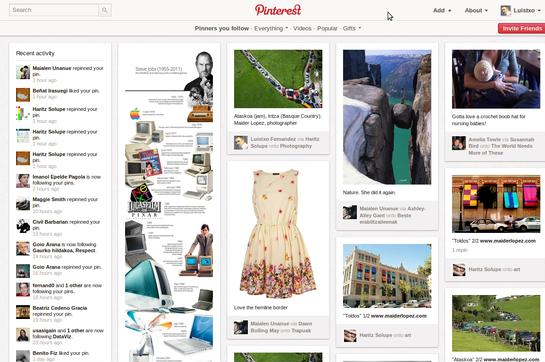Secure your place at the Digiday Publishing Summit in Vail, March 23-25

Pinterest is the latest digital darling. The Web pinboard, where users collect photos of inspirations, has grown to over 11 million users in just nine months. Naturally, it’s in for a backlash. The Achilles heel of the site, like many platforms, is that it isn’t exactly a copyright owner’s dream. The Awl’s Choire Sicha points out that Pinterest’s model is in for a bruising. His argument that the reason no one’s come knocking on the current social-media darling’s door is because photographers have a terrible lobbying group. Which is to say, they don’t have a lobbying group. Pinterest is all fun and games until it attempts to make money beyond the affiliate links it’s using.
One of the problems with this innovative and cool approach by the Wall Street Journal to writing about Pinterest by writing about Pinterest on Pinterest (and it is!) is that there you can’t address that, more than early Napster, more than Megaupload, more than any government-seized hip-hop blog, Pinterest is chock full of copyright infringement. It’s just that, unlike with music and movies, there’s no dumb and hostile industry lobby that represents, say, “every photographer everywhere.” If there was ever a place on the Internet that made you think SOPA was a good idea, it’d be right here! But there is, in the Journal itself, a spiffy little paragraph that says that Pinterest has found that being a website based on publishing other people’s photographs hasn’t “been a significant issue so far.” (They also mention the user agreement, which straight-up says they can sell and “modify” “your” “content.”) In better news, the Journal completely avoids the six deadly sexist traps of writing about Pinterest.
Read Sicha’s post at The Awl. You can follow him on Twitter @choire
More in Media

How creator talent agencies are evolving into multi-platform operators
The legacy agency model is being re-built from the ground up to better serve the maturing creator economy – here’s what that looks like.

Why more brands are rethinking influencer marketing with gamified micro-creator programs
Brands like Urban Outfitters and American Eagle are embracing a new, micro-creator-focused approach to influencer marketing. Why now?

WTF is pay per ‘demonstrated’ value in AI content licensing?
Publishers and tech companies are developing a “pay by demonstrated value” model in AI content licensing that ties compensation to usage.





